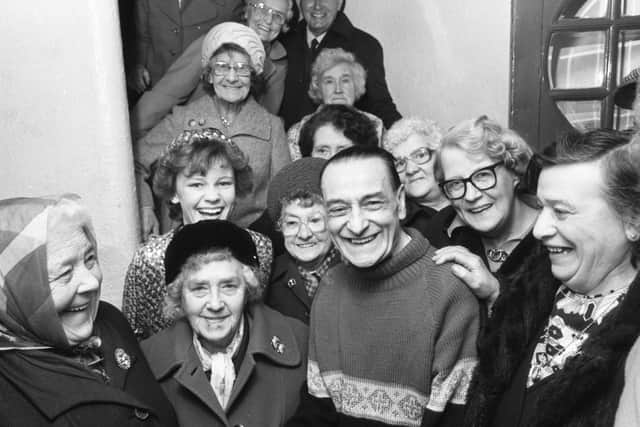Where does the word Mackem come from? The two theories and the Echo's claim to word explained
and live on Freeview channel 276
Is it a badge of honour, or little more than a playground insult? To address the question we need to look at the origin of the word.
The readily accepted explanation is that “we mak ‘em and you tak ‘em” (make them and take them, for the uninitiated) was shipyard parlance that stuck.
Advertisement
Hide AdAdvertisement
Hide AdIt might not be quite so straightforward, although it seems that shipbuilding does come into play. There are two theories on the word’s origin. The first is fairly straightforward.


Theory one.
The word Mackem emerged to mock the people of Sunderland and the way they speak. Shocked?
Nobody should be too bothered by this. Everyone’s accent is mocked and most regional nicknames are, in varying degrees, derogatory in origin.
They become appropriated by the people they’re supposed to ridicule, who then proudly own the word.
Theory two.
The supposed inferiority of “made” ships to “built” ones.
Advertisement
Hide AdAdvertisement
Hide AdIn 1857, County Durham historian William Fordyce wrote: “It came to be derisively said that Sunderland shipbuilders could ‘either build a ship or make one’.”
The inference is that a “made” ship was inferior to a “built” one. But there was never an issue of quality of ships from Wearside we’ll have you know.
Nevertheless, an insult was born, made more offensive as it came about due to Wearside shipbuilders having the temerity to give value for money.
Fordyce went on (and on): “The degree of perfection in construction would seem to have been regulated according to price.
Advertisement
Hide AdAdvertisement
Hide Ad“So recently in 1835, when Lloyd’s Registry was instituted, Sunderland was not found worthy to claim any exemption from the rule that ‘no ship built north of Yarmouth should have a classification of more than ten years.”
Before umbrage is taken it should be mentioned that Fordyce also said that later Sunderland ships were indeed built to the very highest of standards.
First known use of ‘Mackem’ in print.
In 2006 a BBC2 programme hosted by Victoria Coren (before she was Mitchell) called Balderdash and Piffle was broadcast, in which the Oxford English Dictionary’s compilers asked for help with finding the origins and first known uses of words.
One episode concentrated on “Mackem” and attempted to have it placed in the dictionary. A word must be proven to have been in use for a while before it can be included.
Advertisement
Hide AdAdvertisement
Hide AdThe segment was presented by proud Mackem, comedian and DJ, the late Mike Elliott. However the research didn’t reach as far back in time as people might have been expected.
A Sunderland v The Dolphins rugby programme was unearthed from a match played at Ashbrooke on September 5, 1973.
It read: “We still tak ‘em and mak ‘em and ye canna whack ‘em.”
This was pretty darned close, but still not accepted by the Oxford English Dictionary as it didn’t actually use Mackem as a noun.
It’s the Echo wot won it.
Advertisement
Hide AdAdvertisement
Hide AdThe TV show concluded that the earliest known printed use of the word was in none other than the Sunderland Echo, in a 1988 article by the much-missed Frank Entwisle, who died a few months after the programme was broadcast.
He mentioned “Mack-ems” (the hyphen seems to be optional) in a feature about Notorianni’s ice cream parlour.
Frank’s feature referenced Gino, a member of the Notorianni dynasty: “Who has five children and seven grandchildren, all Mack-ems.”
So three hearty cheers for your history-making Echo. We were the first. Or at least the first known.
But when was it first used verbally?
Advertisement
Hide AdAdvertisement
Hide AdIt’s impossible to know. The year 1988 seems remarkably late, even for a first written reference. Those among you who are, let’s say, over 21, will remember Mackem being used decades before that; especially those who worked among our Tyneside brethren.
Is it a real word?
Of course. Victoria Coren took the evidence collated in Balderdash and Piffle and put it to the top brass at the dictionary, who accepted the etymology and the ante-dating.
Thanks to Frank Entwisle, it’s in the Oxford English Dictionary. And once a word enters the dictionary it’s never taken out.
But is it an insult?
You have to feel offended to feel insulted. Mackem started out as a jibe. But it’s in the national vocabulary now and no one is offended. Other names and descriptions born as insults include suffragette, Tory, Yankee and Quaker.
Advertisement
Hide AdAdvertisement
Hide AdThere is one small caveat, a Geordie might feel deeply offended if referred to as a Mackem, but the reverse also applies.
Does it matter?
The origins and first use of the word Mackem may not be of academic interest, its real importance is to do with identity.
Gone are the days of being referred to as a Geordie by non-North Easteners, then having to explain the difference. We’ve reached a point where referring to yourself as a Mackem is instantly understood.
Gerrin!